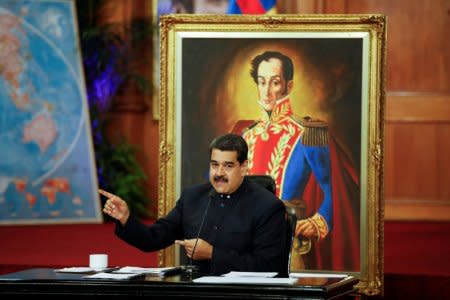Venezuela defends vote, opposition divided over fraud claim

Thomson Reuters
By Girish Gupta and Andrew Cawthorne
CARACAS (Reuters) - President Nicolas Maduro's leftist government defended Venezuela's election system on Tuesday as his opponents struggled to present a united front on allegations of fraud after a nationwide weekend vote.
Despite anger over a crushing economic crisis, the ruling socialists confounded opinion polls to take 17 of 23 governorships in Sunday's gubernatorial elections.
Stunned by a crushing defeat that undermines their aim to win the presidency in 2018, the opposition Democratic Unity coalition refused to acknowledge the results and various leaders called the election rigged, as did the United States.
Though the coalition has complained of an unfair playing field - from abuse of state resources to last-minute moving of vote centers away from opposition strongholds - it has not given detailed evidence of ballot-tampering.
Some opposition figures have acknowledged that abstention by their supporters, disillusioned by the failure of street protests to dislodge Maduro earlier this year, was a big factor.
One losing opposition candidate even conceded defeat, breaking with the official coalition position as he acknowledged a flawed re-election campaign.
"We lost, I say it responsibly," said Henri Falcon, outgoing governor of Lara. "We need courage to recognize truth in adversity."
Government leaders have smarted at fraud accusations.
"Our electoral process is recognized globally as one of the most secure," Foreign Minister Jorge Arreaza told foreign diplomats in a meeting on Tuesday.
The strongest foreign reaction came from Washington, which slammed Maduro's "authoritarian dictatorship," while other major nations from France to Colombia also expressed concern about the adherence to democratic process in the South American OPEC nation.
Heaping further humiliation on Venezuela's opposition, the governors were due to be sworn in on Tuesday by a new legislative superbody elected controversially in July.
The opposition boycotted that vote and has refused to recognize the entirely pro-government Constituent Assembly, which supersedes all institutions including the opposition-controlled congress.
The opposition's five governors-elect looked set to boycott the swearing-in ceremony, defying Maduro's threat to bar them from taking office for failing to accept the assembly as a higher authority.
"We will not kneel to anyone," said Juan Pablo Guanipa, who was elected opposition governor of oil-rich western Zulia state.
Despite widespread food shortages, runaway inflation and a tanking currency, Venezuela's government retains significant bastions of support, especially in poorer, rural parts of the country.
With the opposition coalition's dozens of parties arguing over whether there was fraud, what went wrong, and where to go next, it will need to regroup and map strategy quickly heading into the 2018 presidential campaign.
Its very future may even be in doubt, since many young activists who took to the streets for four straight months of protests and pitched battles with security forces earlier this year feel disillusioned and betrayed by their leaders.
The unrest killed at least 125 people, left thousands injured and arrested and prompted a growing number of Venezuelans to seek refuge abroad.
(Additional reporting by Diego Ore in Caracas and Helen Murphy in Bogota; Editing by Tom Brown)
See Also:

 Yahoo News
Yahoo News 
